This week marks one year since the launch of Australia’s National Strategy for Volunteering. Built through a 12-month co-design process, the National Strategy charts a 10-year roadmap for volunteering in Australia.
The National Strategy contains a vision, underpinned by five vision statements, three focus areas and aims, and eleven strategic objectives. Structuring the National Strategy in this way recognises the three integral pillars of volunteering: people, impact, and infrastructure.

Each of the strategic objectives is accompanied by a case for change, which summarises the qualitative and quantitative data obtained through the co-design process and sourced from other materials. Ensuring each aspect of the National Strategy was evidence-based was critical to demonstrating not just the robustness of its development, but why the eleven strategic objectives were identified as the most significant.

Since its launch, the National Strategy for Volunteering has been downloaded over 4,000 times.
The National Strategy website has been our virtual meeting place since February 2022, with around 22,000 people across Australia visiting to stay informed and have their say on the future of volunteering in Australia.
Over 1,400 National Strategy subscribers have come on the journey so far. Subscribers receive regular updates and are the first to know about opportunities to get involved. Subscribe today.
Read Volunteering Australia CEO, Mark Pearce’s contribution to The Community Advocate, Australia’s National Strategy for Volunteering turns one.

National Strategy in Action: Puffing Billy Railway
Puffing Billy Railway is drawing on the National Strategy for Volunteering to enhance their volunteer management training and broaden and diversify their volunteer base. Volunteer Lead Adele Horkings and the broader Puffing Billy Railway team are also drafting a new volunteering strategy for their organisation to reflect these goals and align with the National Strategy for Volunteering.
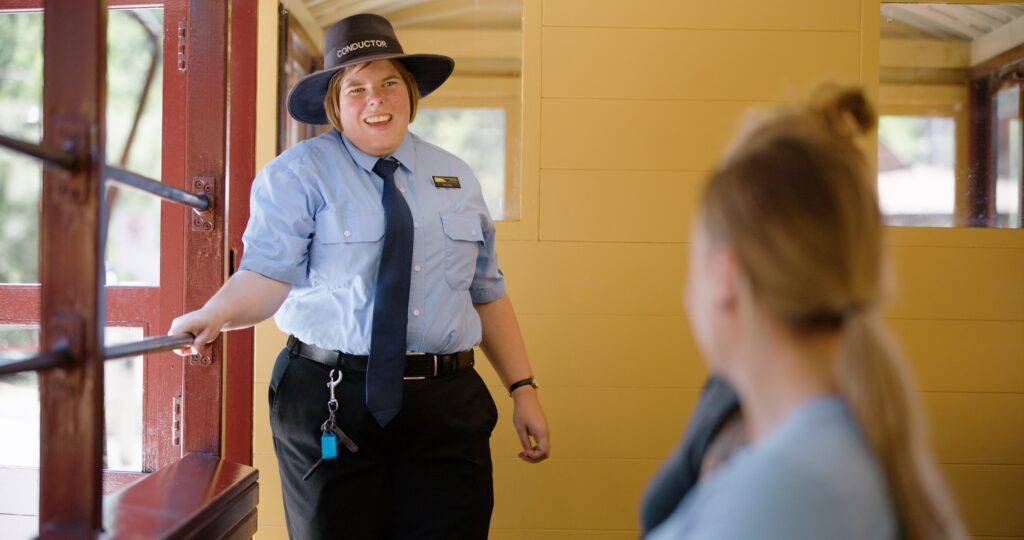
“The National Strategy for Volunteering is one of the first things I open in the morning and when I think about something, I’ll do a search in the Strategy and see what it’s got to say about it.”
Seventy-five percent of Puffing Billy Railway’s workforce are volunteers and Adele is aiming to recognise and celebrate the contributions of volunteers and managers of volunteers. Puffing Billy Railway are also actively working to engage younger Australians with this cultural landmark through young people working groups and an upcoming young people program.
“The National Strategy is a document that I’m referring to all the time, every day. I keep referring to it as my daily guide. I’m just in and out of it all the time.”
The Establishment Phase
The National Strategy for Volunteering’s first anniversary sees it in the Establishment Phase. The purpose of this phase is to set the National Strategy up for success over its ten-year lifespan. During this phase, four key deliverables are progressed:
- Co-Design of a Three-Year Action Plan
- Development of a Monitoring and Evaluation Framework
- Development of a Governance Blueprint
- Development of a Model for Shared Accountability

National Strategy in Action: Vinnies WA
Vinnies WA has embraced the National Strategy and are using it to support their training, grant applications, strategic plans and impact measurement.
“The National Strategy gave us permission to be bold” said May Bowden, Manager, Volunteer Services. “It inspires us to find other ways of improving the volunteering experience.”

May described how Vinnies WA applied the National Strategy to their volunteer engagement including implementing exit surveys, writing a regular newsletter on volunteer impact and partnering with a local college to measure the outcomes of their volunteering strategy.
“The National Strategy has high level concepts that we share in our management meetings, but it also has practical applications at a lower level. It could easily be the fundamentals of an operations plan, which is what we did.”
Establishment Phase Updates
In addition to progress on the Establishment Phase deliverables, the past year has also included:
- Recruiting an expanded National Strategy for Volunteering team.
- Appointing and hosting the first meeting of the new National Strategy for Volunteering Council.
- Refreshing the Research Working Group, which will continue to advance the national volunteering research agenda.
- Appointing an Establishment Design Team that will consolidate consultation findings and other ideas into the draft Action Plan.
- Presenting the National Strategy for Volunteering at conferences and events around Australia.
- The National Strategy being recognised with the Good Design Award for Excellence and Innovation.
- Promoting the National Strategy internationally, helping colleagues across the world learn from the project methodology as they embark on their own volunteering strategy projects.
- Advancing the National Strategy through policy and advocacy initiatives, including key national reform agendas such as the Australian Government’s Not-for-profit Sector Development Blueprint, work being undertaken to build a stronger, more diverse and independent community sector, and the Productivity Commission Inquiry into Philanthropy.

National Strategy in Action: Australian Catholic University
The Australian Catholic University (ACU) utilised the National Strategy for Volunteering to successfully make the case for a National Volunteer Week initiative in 2023. The National Strategy helped to highlight the importance of acknowledging and celebrating the significant contribution of ACU’s 2500 alumni volunteers to the life and work of the University.
“I used language out of the National Strategy to argue that celebrating and raising awareness of National Volunteer Week is not only a key part of supporting volunteering, it is also critical to our attempts to professionalise volunteering within our institution,” said Sarah O’Connor, Alumni Manager, Volunteering and Programs.
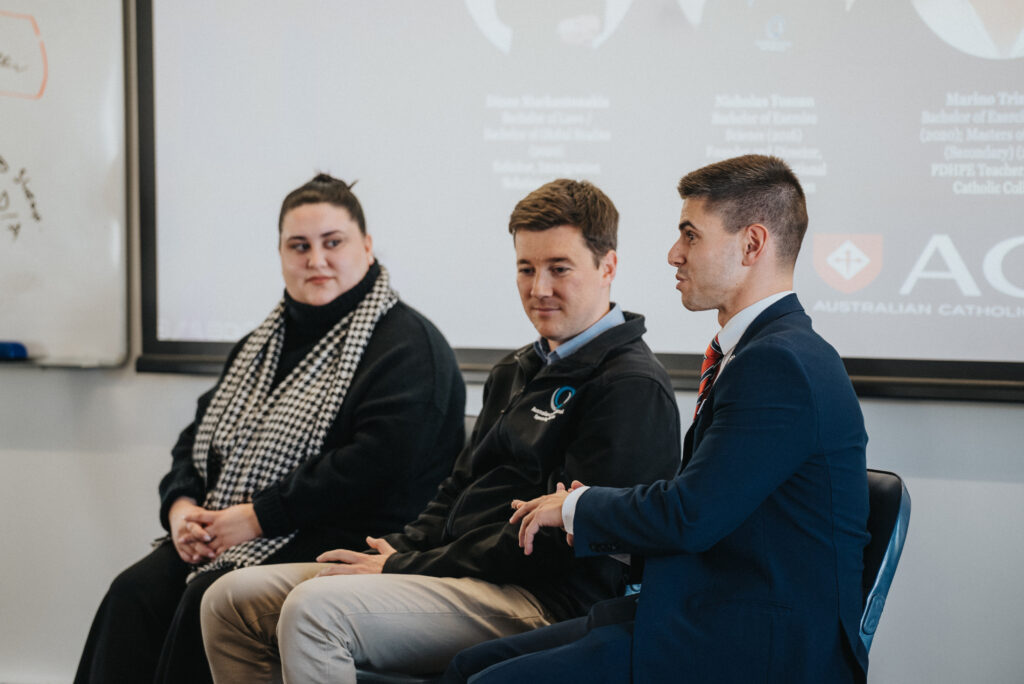
“Volunteering is a core part of our alumni strategy at ACU; its contribution to the common good is well recognised and championed by the University.”
The National Volunteer Week initiative shared testimonials and statistics on the contribution of alumni to teaching, learning, recruitment, and retention activities at ACU; highlighted the various volunteering opportunities available to alumni and faculty; and celebrated the impact ACU alumni make in the broader community through volunteering.
Sarah has been seeking to professionalise alumni volunteer engagement practices within a tertiary education setting, working to ensure that each alumni contribution is acknowledged, and each volunteering opportunity offers a reciprocal benefit to alumni volunteers.
Testimonials from alumni have attested to the professional development opportunities offered through our volunteering programs. One ACU alumnus shared that “being a volunteer alumni guest speaker at the Australian Catholic University has been a highly rewarding experience. I have been able to share my personal experiences and insights with current and future students and offer them guidance as they embark on their own academic and professional paths. With the demands of my day-to-day duties as an educator, it can be challenging to find time to reflect, but volunteering as an alumni speaker has provided me with the opportunity to do so. Additionally, this experience has helped me to sharpen my public speaking skills and connect with other educators. I look forward to continuing to support and motivate the next generation of ACU graduates.”
Online Events
Regular online events have promoted the National Strategy for Volunteering and empowered others to consider how they can implement the National Strategy in their own organisations and communities. Over 2,000 people registered to join us at our online events including:
- Exploring the National Strategy for Volunteering
- Volunteering Research Papers Initiative – Round 3
- Establishing the National Strategy for Volunteering
- Trends in Volunteering: Insights from 2023
- Volunteer Management and the National Strategy
- Individual Potential and the Volunteer Experience
Many of our events have included guest speakers and the opportunity for Q&A. All events are recorded and available to watch on our YouTube Channel.

National Strategy in Action: Bush Heritage Australia
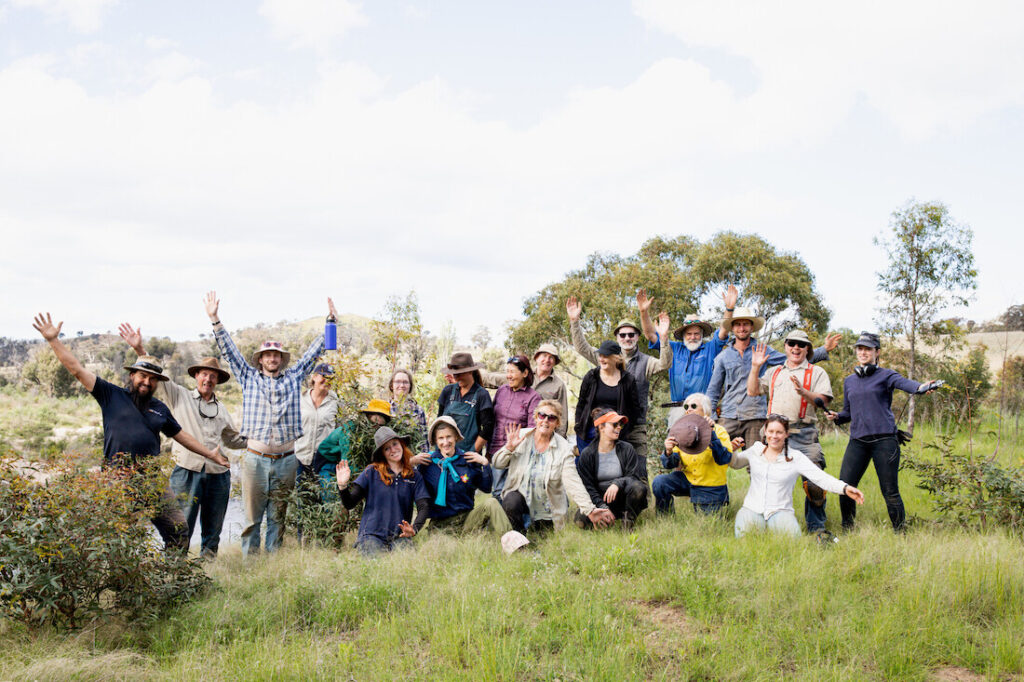
Bush Heritage Australia will be incorporating the National Strategy for Volunteering into their own Volunteer Engagement Strategy in 2024. Katie Ronald, National Volunteer Program Coordinator, identified a strong thematic overlap between the National Strategy’s Strategic Objectives and several of Bush Heritage Australia’s own volunteer program objectives and future initiatives.”
“The National Strategy for Volunteering has been set out in a way that makes it easy to navigate and to see correlations with our own strategy. I’m excited to work with my team in 2024 to create stronger links between it and our own Volunteer Engagement Strategy 2030.”
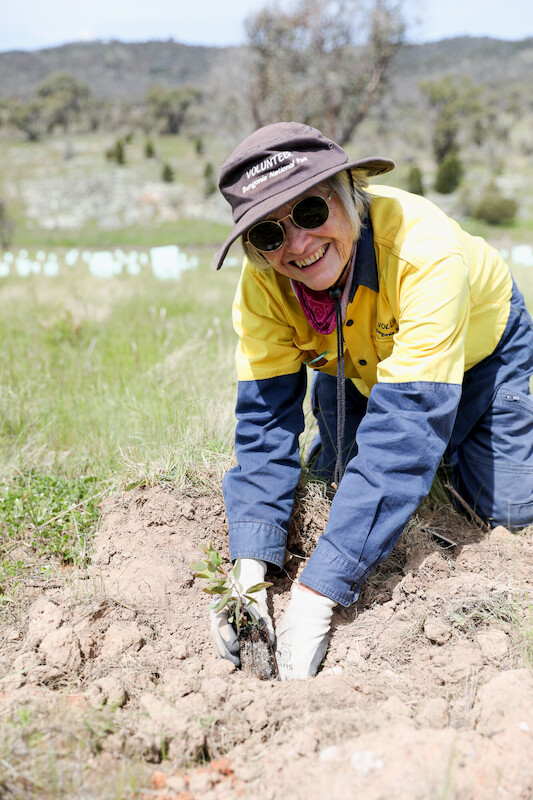
Bush Heritage Australia is seeking to enhance the volunteer experience and make volunteering more inclusive and accessible. They aim to do this by helping older volunteers become more comfortable using technology and providing them with opportunities, to transition from reserve-based volunteering to other roles such as Team Leaders, members of the Volunteer Advisory Committee or home-based volunteers. The organisation is also seeking to engage younger volunteers on properties that are closer to capital cities and offering ‘one - off’ volunteering opportunities that fit in with their lifestyle.
Some of Bush Heritage Australia’s volunteer roles have accessibility limitations. Katie said they are looking to “change that narrative” by creating more inclusive roles: “How can we get them volunteering in other parts of the organisation? This in turn helps us diversity our volunteering opportunities even more.”
Bush Heritage Australia already actively involves volunteers in their decision-making processes, through workshops and focus groups. This will continue and expand so that volunteers inform even more of the content of their volunteering programs.
Co-Design Journey
The project to develop the National Strategy for Volunteering was unique: funded by the Department of Social Services, led by Volunteering Australia, and designed by the volunteering ecosystem. This partnership approach proved that collaboration, built on a foundation of trust and transparency, delivers real outcomes.
Throughout the co-design development process, the project benefited from the breadth and depth of expertise of thousands of people and organisations.
The development co-design journey involved 1541 individual engagements with stakeholders representing 672 organisations, groups, and interests from across the volunteering ecosystem. A considerable number of stakeholders who were involved in the project participated on multiple occasions and through a variety of consultation methods. A further 4932 participated in the Volunteering in Australia research and surveys.
This co-design journey continues through the first-year Establishment Phase and into the future of Australia’s ten-year National Strategy for Volunteering. Co-design workshops are being held in February and March; click here for more information and registration links.
The National Strategy for Volunteering is our map – it is up to us to navigate the journey to 2033 together.

National Strategy in Action: MND Victoria
MND (Motor Neurone Disease) Victoria works with over one hundred volunteers who support the organisation’s operations through a range of carer and non-carer roles. Deb Olive, Volunteer Engagament Team Leader, is utilising the National Strategy for Volunteering to enhance the volunteering experience in a number of ways.
“Volunteers provide the foundation for the work of MND Victoria and as the organisation grows and changes it is essential for us to ensure our volunteers are involved in meaningful roles, which are safe for them to be engaged in as well as safe for our clients and their families. The National Strategy has helped to focus the development of our programs and processes to ensure they are inclusive and accessible for communities across the state.”
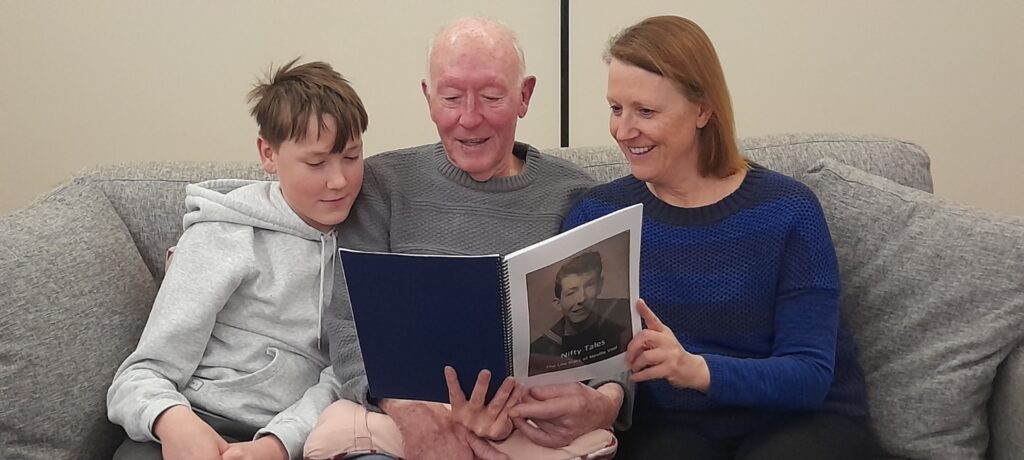
Deb has drawn upon both the National Strategy and Volunteering Australia’s research in successfully advocating for MND Victoria to develop its own volunteering strategy. The organisation has increased their volunteer engagement staff from one to two members, effectively doubling their resourcing for volunteer management.
“The National Strategy provided a framework to support the development of our MND Victoria Volunteer Engagement Strategy. It was valuable to utilise the National Strategy to inform and underpin the business case to our Management Team and Board for future needs and directions for how we work with and engage volunteers and the resourcing required to make this happen.”
MND Victoria is also seeking to recruit volunteers from a wider and more diverse base. Deb is actively searching for ways to benefit volunteers from different age demographics (e.g. students) and cater to their specific needs and aspirations.
Share Your Story
Has the National Strategy for Volunteering influenced your work?
Want to hear about how the National Strategy can help you and your volunteering?
Do you have plans to use the National Strategy for Volunteering?
We want to hear from you! Please write to nationalstrategy@volunteeringaustralia.org today to share your thoughts, collaborate on future projects, and connect with like-minded members of the volunteering ecosystem.

National Strategy in Action: The Salvation Army
Ciska Burrie, Volunteer Resources Developer at The Salvation Army has helped to develop their Volunteer Resources Toolkit which supports The Salvation Army’s managers of volunteers in applying best practice in planning, recruiting and managing volunteers. Ciska has revised the toolkit to include a library of volunteer management topics based on the stages of volunteer involvement. Each topic references the relevant National Standards for Volunteer Involvement, the National Strategy for Volunteering and its Strategic Objectives, as well as incorporating content from Volunteering Australia’s research. This toolkit provides the knowledge base for building managers of volunteers’ capability through online sessions, podcasts, self-assessment, and a reading and video library.
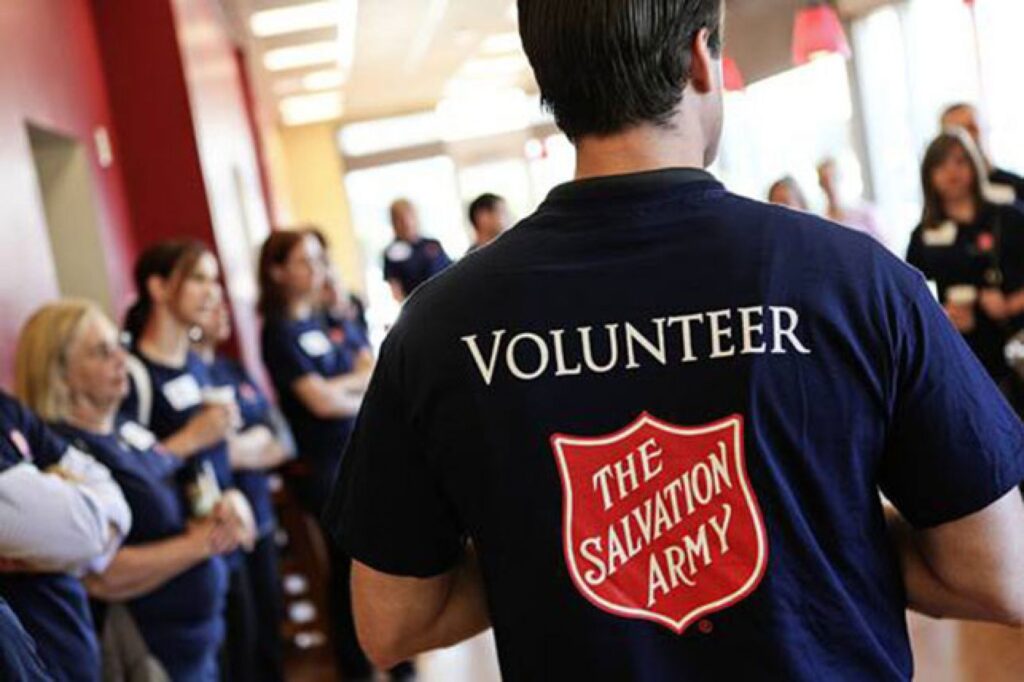
“At Salvation Army, we are keen to ensure the National Strategy aligns with our own Volunteer Involvement Strategic Action Plan and is incorporated into our overall HR strategy.”
The Salvation Army’s Volunteer Resources department also recently conducted their inaugural Volunteer Engagement Survey which had 1800 respondents. The survey questions were aligned with The Salvation Army’s Employee Engagement Survey, where comparison of the data between these two worker groups can bring specific insights as a reflection of the volunteer voice. This research can then inform the content of The Salvation Army’s volunteering programs and improve the volunteering experience. This goal strongly aligns with National Strategy Objective 1.1 ‘Focus on the Volunteer Experience’ and The Salvation Army’s own initiative of ‘The Volunteer Voice’ which started in 2023 with the survey.
“We have compared the National Strategy’s 11 strategic objectives to our plan to get a sense of how we are aligning with and supporting the wider volunteer sector’s focus and ambitions.”






